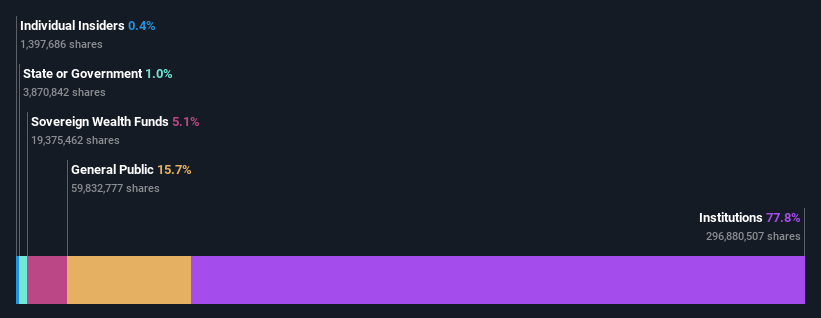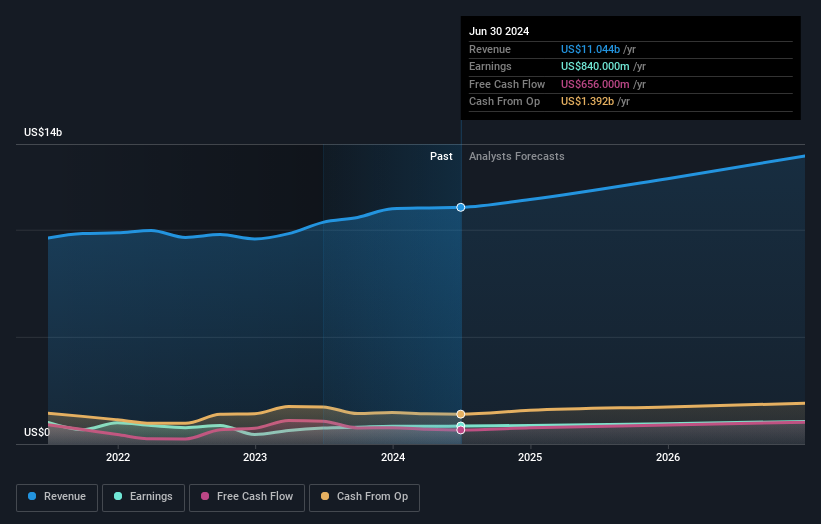- United States
- /
- Hospitality
- /
- NYSE:YUMC
Yum China Holdings, Inc.'s (NYSE:YUMC) recent 5.8% pullback adds to one-year year losses, institutional owners may take drastic measures

Key Insights
- Given the large stake in the stock by institutions, Yum China Holdings' stock price might be vulnerable to their trading decisions
- 50% of the business is held by the top 18 shareholders
- Insiders have bought recently
A look at the shareholders of Yum China Holdings, Inc. (NYSE:YUMC) can tell us which group is most powerful. And the group that holds the biggest piece of the pie are institutions with 78% ownership. That is, the group stands to benefit the most if the stock rises (or lose the most if there is a downturn).
And institutional investors endured the highest losses after the company's share price fell by 5.8% last week. The recent loss, which adds to a one-year loss of 10% for stockholders, may not sit well with this group of investors. Often called “market movers", institutions wield significant power in influencing the price dynamics of any stock. Hence, if weakness in Yum China Holdings' share price continues, institutional investors may feel compelled to sell the stock, which might not be ideal for individual investors.
Let's take a closer look to see what the different types of shareholders can tell us about Yum China Holdings.
Check out our latest analysis for Yum China Holdings

What Does The Institutional Ownership Tell Us About Yum China Holdings?
Institutions typically measure themselves against a benchmark when reporting to their own investors, so they often become more enthusiastic about a stock once it's included in a major index. We would expect most companies to have some institutions on the register, especially if they are growing.
As you can see, institutional investors have a fair amount of stake in Yum China Holdings. This suggests some credibility amongst professional investors. But we can't rely on that fact alone since institutions make bad investments sometimes, just like everyone does. If multiple institutions change their view on a stock at the same time, you could see the share price drop fast. It's therefore worth looking at Yum China Holdings' earnings history below. Of course, the future is what really matters.

Since institutional investors own more than half the issued stock, the board will likely have to pay attention to their preferences. Hedge funds don't have many shares in Yum China Holdings. GIC Private Limited is currently the company's largest shareholder with 5.1% of shares outstanding. In comparison, the second and third largest shareholders hold about 4.5% and 4.2% of the stock.
Looking at the shareholder registry, we can see that 50% of the ownership is controlled by the top 18 shareholders, meaning that no single shareholder has a majority interest in the ownership.
While it makes sense to study institutional ownership data for a company, it also makes sense to study analyst sentiments to know which way the wind is blowing. There are plenty of analysts covering the stock, so it might be worth seeing what they are forecasting, too.
Insider Ownership Of Yum China Holdings
The definition of company insiders can be subjective and does vary between jurisdictions. Our data reflects individual insiders, capturing board members at the very least. Company management run the business, but the CEO will answer to the board, even if he or she is a member of it.
I generally consider insider ownership to be a good thing. However, on some occasions it makes it more difficult for other shareholders to hold the board accountable for decisions.
Our data suggests that insiders own under 1% of Yum China Holdings, Inc. in their own names. It is a very large company, so it would be surprising to see insiders own a large proportion of the company. Though their holding amounts to less than 1%, we can see that board members collectively own US$66m worth of shares (at current prices). It is good to see board members owning shares, but it might be worth checking if those insiders have been buying.
General Public Ownership
The general public, who are usually individual investors, hold a 16% stake in Yum China Holdings. This size of ownership, while considerable, may not be enough to change company policy if the decision is not in sync with other large shareholders.
Next Steps:
I find it very interesting to look at who exactly owns a company. But to truly gain insight, we need to consider other information, too.
I always like to check for a history of revenue growth. You can too, by accessing this free chart of historic revenue and earnings in this detailed graph.
Ultimately the future is most important. You can access this free report on analyst forecasts for the company.
NB: Figures in this article are calculated using data from the last twelve months, which refer to the 12-month period ending on the last date of the month the financial statement is dated. This may not be consistent with full year annual report figures.
New: Manage All Your Stock Portfolios in One Place
We've created the ultimate portfolio companion for stock investors, and it's free.
• Connect an unlimited number of Portfolios and see your total in one currency
• Be alerted to new Warning Signs or Risks via email or mobile
• Track the Fair Value of your stocks
Have feedback on this article? Concerned about the content? Get in touch with us directly. Alternatively, email editorial-team (at) simplywallst.com.
This article by Simply Wall St is general in nature. We provide commentary based on historical data and analyst forecasts only using an unbiased methodology and our articles are not intended to be financial advice. It does not constitute a recommendation to buy or sell any stock, and does not take account of your objectives, or your financial situation. We aim to bring you long-term focused analysis driven by fundamental data. Note that our analysis may not factor in the latest price-sensitive company announcements or qualitative material. Simply Wall St has no position in any stocks mentioned.
About NYSE:YUMC
Yum China Holdings
Owns, operates, and franchises restaurants in the People’s Republic of China.
Solid track record with excellent balance sheet.


